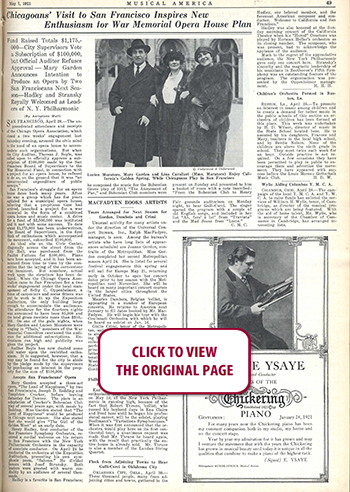 100 YEARS AGO IN MUSICAL AMERICA (392)
100 YEARS AGO IN MUSICAL AMERICA (392)
May 7, 1921
Page 49
Chicagoans’ Visit to San Francisco Inspires New Enthusiasm for War Memorial Opera House Plan
Fund Raised Totals $1,175,000—City Supervisors Vote a Subscription of $100,000, but Official Auditor Refuses Approval—Mary Garden Announces Intention to Produce an Opera by Two San Franciscans Next Season—Hadley and Stransky Royally Welcomed as Leaders of N. Y. Philharmonic
(By Aeroplane Mail)
SAN FRANCISCO, April 28.—The unprecedented attendance and receipts of the Chicago Opera Association, which closed a two weeks’ engagement last Saturday evening, aroused the civic mind to the need of an opera house to accommodate such organizations. But when the City Auditor, Thomas J. Boyle, was called upon to officially approve a subscription of $100,000 made by the San Francisco Board of Supervisors to the War Memorial Fund, in connection with a project for an opera house, he refused to do so, on the ground that it was “an unwarranted expenditure of public moneys.”
San Francisco’s struggle for an opera house dates back many years. After the war a group which has for years agitated for a municipal opera house, believing that a propitious time had arrived, launched a project for a war memorial in the form of a combined opera house and music center. A drive for a fund of $2,500,000 was instituted and it met with some success. To date about $1,175,000 has been underwritten. The Board of Supervisors, in the first flush of enthusiasm which accompanied the movement, subscribed $100,000.
An ideal site on the Civic Center, diagonally across the street from the City Hall, was purchased from the Paulist Fathers for $300,000. Plans have been accepted, and it has been announced from time to time by the committee that the laying of the cornerstone was imminent. But somehow, actual work upon the structure has been delayed. When the Chicago Opera Association came to San Francisco for a two weeks’ engagement under the local management of Selby C. Oppenheimer, a force of carpenters and scene fitters was put to work to fit up the Exposition Auditorium, the only building large enough to accommodate the audiences. The attendance for the fourteen nights was announced to have been 85,000 and the total gross receipts more than $250,000. On one of the gala nights, when Mary Garden and Lucien Muratore were singing in “Thaïs,” members of the War Memorial Committee canvassed the audience for additional subscriptions. Enthusiasm ran high and publicity was given the project.
Auditor Boyle has now dashed some cold water upon the revivified enthusiasm. It is suggested, however, that a way may be found for the city to abide by the pledge made by the supervisors by purchasing an interest in the property for the sum of $100,000.
Accepts San Franciscans’ Opera
Mary Garden accepted a three-act opera, “The Land of Happiness,” by two San Franciscans, Joseph D. Redding and Templeton Crocker, before leaving Saturday for Denver. The piece is an adaptation of Crocker’s Bohemian Club play of several years ago, with music by Redding. Miss Garden stated that “The Land of Happiness” would be produced in Chicago next season. She also stated that she would give “The Girl of the Golden West” at an early date.
Henry Hadley, first conductor of the San Francisco Symphony Orchestra, received a cordial welcome on his return to San Francisco with the New York Philharmonic Orchestra in the capacity of associate conductor. On April 24 he conducted the orchestra at the Exposition Auditorium, presenting his own symphonic poem, “Salomé.” He divided honors with Josef Stransky. Both leaders were greeted with warm cordiality by an audience of several thousands.
Hadley is a favorite in San Francisco; he composed the music for the Bohemian Grove play of 1912, “The Atonement of Pan,” Bohemian Club members were present on Sunday and presented to him a basket of roses with a note inscribed: “From the Bohemian Club to Henry Hadley, our beloved member, and the foremost American composer and conductor. Welcome to California and San Francisco.”
Hadley was also honored at the Sunday morning concert of the California Theater when his “Herod” Overture was played by Herman Heller’s orchestra as its closing number. The composer, who was present, had to acknowledge the applause of the audience.
Much to the regret of the appreciative audience, the New York Philharmonic gave only one concert here. Stransky’s sincerity and the magnetic leadership of his musicians in Beethoven’s Fifth Symphony was an outstanding feature of the program. The organization was presented by the Oppenheimer management. —M. H. H.




 RENT A PHOTO
RENT A PHOTO





